No “V-shaped recovery back to normal.”
By Wolf Richter for WOLF STREET.
Demand for gasoline collapsed in a stunning and historic manner, starting in mid-March when the measures to slow down the spread of the pandemic took effect, when working from home became the new thing, and when millions of people lost their jobs on a weekly basis and stopped driving to work. Gasoline consumption, after bottoming out in the week ended April 3 with a year-over-year plunge of -48%, to 6.7 million barrels per day, the lowest in the EIA’s data going back to 1991, the great recovery began – and fizzled.
Gasoline consumption in the week ended June 12, at 7.87 million barrels per day, was still down 20.7% year-over-year, according to data reported by the EIA today. It has been about the same 20% year-over-year decline four weeks in a row:
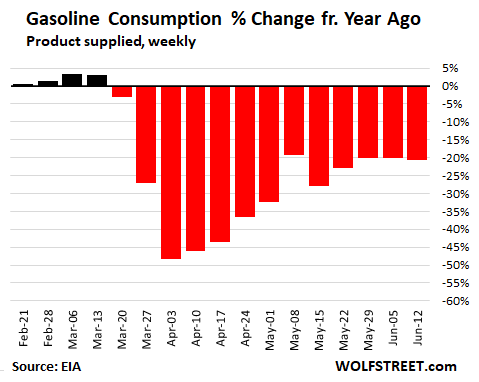
The EIA measures weekly consumption in terms of product supplied, such as by refineries and blenders, and not by retail sales at gas stations.
The level of gasoline consumption of 7.87 million barrels per day is still below any pre-pandemic consumption levels since the week in September 2001 after the 9/11 attacks. The WTF moment came in late March and April, when gasoline consumption collapsed. Even now, gasoline consumption remains below the low points during the Great Recession. And this is the beginning of driving season!
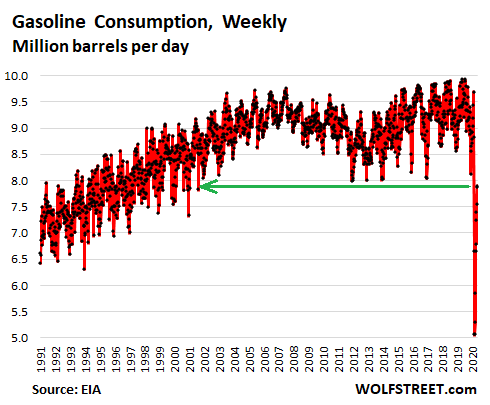
Gasoline hasn’t been exactly a booming business since around 2005. The decline in consumption during the Great Recession was followed by a recovery and finally new records starting in 2016. In other words, no growth for a decade.
Jet fuel.
Consumption of jet fuel (kerosene type) in the US – based on jet fuel supplied, the EIA’s proxy for consumption – began to get hit in February as flights from the US to China were being cancelled. In April and May, demand for jet fuel collapsed by as much as 80% year-over-year in the two worst weeks. And in the week ended June 12, according to data released today by the EIA, consumption of jet fuel, was still down 53% from a year ago:
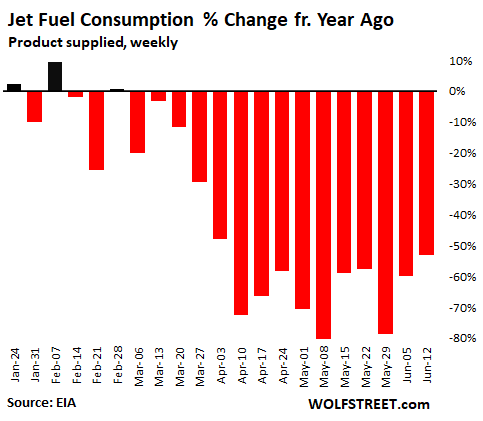
Demand for jet fuel had collapsed to just 352,000 b/d in the week ended May 8, by far the lowest in the data going back to 1991. In the week ended June 12, jet fuel consumption was 788,000 b/d, still far below any pre-pandemic consumption levels going back to 1991:
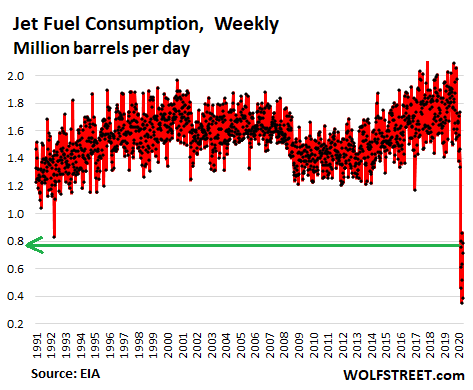
Distillate.
Distillate includes diesel fuels used by trucks and some cars, railroad engines, agricultural implements, diesel generators, and the like. It also includes fuel oils, such as for space heating and power generation, where demand is very seasonal, with spikes during heating season. So this is volatile and impacted by the weather. Nevertheless, trucking and railroads have been in a sharp decline for over a year, and this shows up in the consumption of distillate.
In the week ended June 12, distillate consumption was down 12.2% from last year. It has been down for most of this year so far, but the year-over-year declines steepened in April and May. The decline, maxing out at -25%, however is pale compared to -48% during the worst week for gasoline and -80% during the worst two weeks for jet fuel.
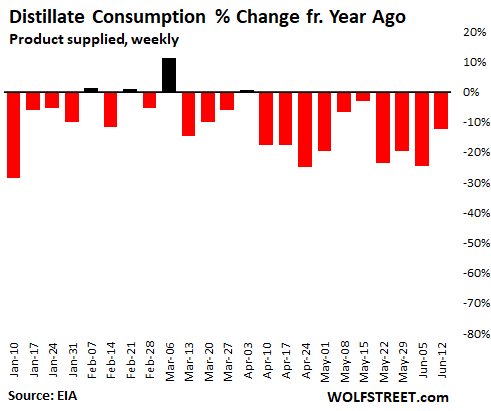
At 3.55 million b/d in the week ended June 12, distillate consumption remains were it had been over two decades ago:
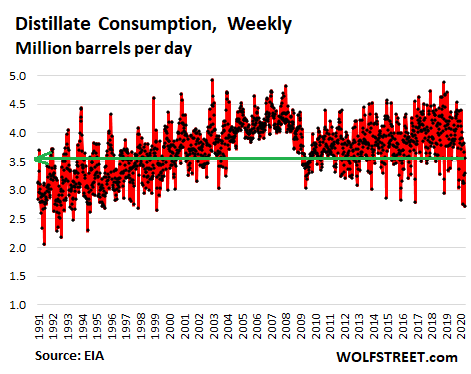
Combined total still down 22%.
Gasoline, jet fuel, and distillate consumption combined was still down by 22% year-over-year in the week ended June 12. At 12.21 million b/d, it was still below pre-pandemic consumption levels going back to April 1999 (12.23 million b/d) and December 1998 (12.24 million b/d), which were close.
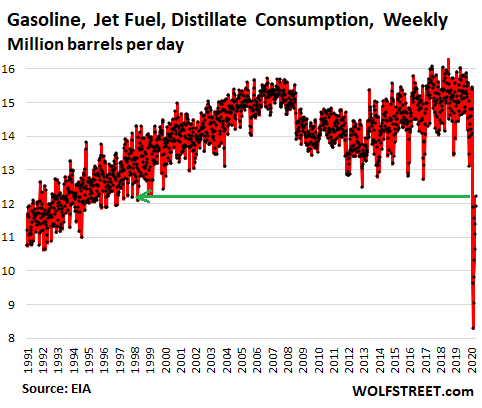
This is the scenario that the US oil industry is facing: An unprecedented plunge in consumption that even in mid-June remains 22% below last year – a plunge that, while not as bad as it was in April, seemed unthinkable just a few months ago.
Consumption will gradually increase from here. But looking at what happened during and after the Great Recession, it will likely take years for demand to recover, even after the 30 million or so people who’ve lost their jobs are working and commuting again.
And there is a good chance combined consumption will not recover fully to its prior peak levels for a number of reasons.
All automakers are switching part of their production to EVs. Over the next few years, EVs will play an ever-larger role in the national fleet and will eventually put a visible dent in gasoline consumption, and oil companies are concerned about that, because no one wants to be in a business that faces long-term structural decline.
At the same time, working-from-home at least part of the time will be the new model for many workers. And in terms of jet fuel, teleconferencing is taking the place of a good number of business trips, and the fact that this works just fine and saves a lot of time and money is now being proven on a daily basis.
This is one more way in which this crisis will leave its long-term imprint on the economy. And the old normal is gone for good.
It’s going to be a tough slog forward. Read… This Better Be the Bottom for the Goods-Based Sector in the US
Enjoy reading WOLF STREET and want to support it? You can donate. I appreciate it immensely. Click on the beer and iced-tea mug to find out how:
Would you like to be notified via email when WOLF STREET publishes a new article? Sign up here.
![]()


Stunning. I just spent this evening talking with my spouse about how we’re going to see family and friends in the next year or so. Air travel is out because of the petri dish affect. Driving and camping along the way is a reasonable option. Everyone is cutting back and the world is awash in oil….
I have begun showering in kerosene and brushing my teeth with diesel. I flush my toilets with bunker fuel.
Smart. Those will probably contain less benzene than will water will by the time our current EPA finishes up.
Even if you smoke when doing all this, the flammability of the distillates is very low. Just don’t try this with gasoline.
I’m long bp, xom, cvx , fang, slb, hal and nbr, so I greatly appreciate your efforts.
Don’t suppose you did any calculations on which uses more oil?
Flying in a jet across country.
Driving a vehicle across country.
Hint. An average car weighs around 2.800 lbs
Car and plane fuel efficiency is pretty similar assuming you have 3 passengers in the car (which is probably a reasonable assumption for a family getaway – if not understating it). Even the newest planes only have per-seat efficiencies of around 90-110 mpg. The average car gets 30 mpg. So, 3 passengers and I’m at 90 mpg.
The difference is that people typically fly much longer distances than they drive so flying tends to use more fuel in practice.
I don’t think the ‘economy of fuels’ had anything to do with their decision.
I wish that I could be more sympathetic to the oil producers, but they are like tobacco growers or opioid producers. It is ironic that a collapse in oil products use might be the best thing that could have happened to the environment.
Sadly, I am sure that we will be taking all petrochemicals out of the ground until environmental conditions become obviously dire– probably long after they become obviously dire.
The net worth of the oil majors depends on their reserves, so if they were limited in their ability to take out those reserves, their net worth would suffer. That is why I look at their investments in biofuel, renewable energy, etc., with suspicion: they are like sellers of chemotherapy drugs who are buying all companies that are researching quick, one pill cures for cancer; they have conflicts of interests.
It will be sad to see all of those beautiful Malibu, seaside homes flooded by storms or full moons more and more as the seas rise. I suspect that certain events involving gas reserves, such as the temperature rise causing an unforeseen release of gas under the sea (methane hydrates) or in permafrost, will create vicious circles, so that will happen even sooner than predicted.
It looks like our coming century will produce the material for a good dozen, historically accurate, disaster movies. :-)
The long-term structural changes are good; we need to get all of these numbers to about zero in order to have a livable planet. Which gives you some idea of the size of the challenge facing us as a society, and politicians who have the guts to focus on something beyond the next election.
If you want a livable planet the goal needs to be to get the human population down to zero.
We are the problem.
Our high numbers aren’t helping, but no, it’s our current socio-economic-political system that is the problem. Humans have lived on this planet for 100,000s of years, but our ecological crisis is a relatively recent development, accelerating in the last century.
Yes, our system is a major problem -probably fatal at this stage – but all human groups have faced periodic ecosystem crises, even barbarian tribes and nomads, often leading to their extinction as societies.
Civilization is – in itself, by its very nature – devastating and therefore doomed, over varying time-scales.
We’ve been able to extend and pretend due to energy production on a scale impossible until the late 20th century.
The abyss now looms before us, collectively, but there is still some time for fun, just a little.
Population growth is the result of technology that enables higher productivity, specifically the production of necessities like food that have fundamentally allowed the population to swell quite astoundingly. Now standards of living are rising on the aggregate for these vast swaths as they increase, which means an even more rapid ballooning of resources consumption due to the multiplier effect. Even if new technology allows our resource utilization becomes relatively sustainable and better for the wider environment, populations are still swelling and increasingly leaving less and less room for complex ecosystems and biodiversity. Nature’s solution for this kind of madness is usually predators but we don’t seem to be in any danger of that except by psychopathic war thirsty politicians.
Humans have lived on this planet at this standard of living for about a 100 years. No fossil fuels you go back to the eighteen hundreds .
I’m guessing that the “next” Virus will be such that it destroys our internal reproductive works. Then we are doomed! Have fun while you can!!
Ecological crisis is a relatively recent development because of our numbers. The earth is a finite environment. We used to have (NOT LONG AGO), vast stretches of wilderness. Just 150 years ago, man was mowing down the buffalo from trains with machine guns. All of the “ecological” changes have occurred because of our numbers which NEVER STOP GROWING.
You’re 100% wrong. It’s STRICTLY about our numbers. Every single human requires a minimum amount of resources to survive. That translates to an impact on the environment for the length of that person’s life. Yes, some people have bigger carbon footprints, but not just carbon either. When a human is eradicating a species to put food on the table, that has NOTHING to do with carbon. When humans dump their garbage in the ocean out of convenience, that has nothing to do with carbon, etc, etc, etc.
You do realize that about 2 billion folks in Africa and Asia want to join the middle class?
And will be buying, among many other items, low cost ICE vehicles.
“The long-term structural changes are good…”
Battery EV are lower cost by the time the car plants are build in those countries.
We have a livable planet because earth’s temperatures are warmer than they were 60 years ago.
If temperatures had not risen we would be faced with famines and starvation given a world of 7.8 million people. Thanks to the warmer weather, and the longer growing seasons, meteorological famine has become a thing of the past. Energy costs and consumption also fall with warmer weather.
Pure conjecture. So you are saying man can’t do technology in cooler climate. Not remotely rational.
I love it. Timbers the rationalist. Five year plans with everything rationally thought out to the last nail by the politburo. U landed in the wrong country and century. Good times surely missed.
Great way of saying something without saying anything at all, RagnerD. But I’m sure you meant something by it. Just no idea what.
Haha. Oh, that explains it. You don’t know history.
The Haber Bosch process, which converts Nitrogen and Hydrogen into Ammonia, was also instrumental in increasing the world population. Without that process, there would not be fertilizer in the current quantities. Before that, we were almost fighting for deposits of guano.
We’ve been indirectly growing crops using fossil fuels for quite some time now. That’s something which is very much underestimated. We might even include pesticides with that as well.
As to climate; that’s just one thing. Erosion, food waste (25+% according to some research!) and bio-fuel madness are also factors. As we’re seeing now in the US, it’s about the food system, not food production. It’s insane that there’s now food being thrown away at a large scale, while a lot of people go hungry.
The warmer weather is very bad from a fuel consumption view. Here in central NY for 50 years I never had an AC unit. In the past 5 years from the heat and new pattern of afternoon thunderstorms, it’s a must. So in central NY, it’s very bad, puts us in the wrong direction. Maybe in aggregate, it’s better, but not here.
Regarding the planet: In the words of George Carlin “The planet will be fine… its the people who will be f****d”.
Sadly Gasoline in Southern California is still relatively expensive…so much for collapse in demand. Those summer blend prices will keep us in check for a while…
relatively…how much more expensive after you take out the specific CA taxes and refining regulations?
From Sunday’s LA Times:
“SACRAMENTO — California’s gas tax is set to increase July 1, but some lawmakers are calling for a freeze on the higher levy, citing the financial burden of the coronavirus-spawned recession on millions of the state’s residents.”
It is the ideal moment to raise gas taxes. Would even argue that with low price it is the moment to raise them even more and use that to lower other taxes/fees
What’s with the sharp decline in jet fuel usage in 1992? Just a slow economy or was there some other disruption going on?
Gulf War would be my guess.
Iraq’s invasion of Kuwait, the US buildup and then Desert Storm was a little earlier, August 1990 – February 1991.
I think it had to something with jet fuel inventory keeping regulations in the US, but flights cancelled due to bad weather could also show up in the data.
My guess would be the use of ‘secondary stocks’ available, before continuing the use of ‘demand’ orders.
I’ve really been enjoying the clear blue skies over my home, the sky is usually full of regional and international airlines passing over….plus there is an international airport 30km away and half the time we’re right in the landing path. It appears it’ll take a few more months for flights to return.
I read an article the other day that said many many European countries are very thankful for the collapse in tourism and want it reduced going forward.
But we’re all tourists when we leave our homes and neighbourhoods, aren’t we? I want to put a sticker on my van proclaiming north island residency but decided it was no use. This virus is just beginning to reveal knock-on effects. Hopefully, people remain civil.
If one stops and considers it for a moment, tourism is probably not a good way of expanding one’s economy. It’s a strange phenomenon: people come to your country to gawk at things and buy trinkets, and their visit is sustained by an army of under-skilled and under-paid workers, such as bus drivers, cooks, maids, etc.
All the while the locals resent the onslaught.
On top of that: mass tourism can also divert skilled labour to do work they are overeducated for. And for once that is not an issue of the educational system, since museums, historic sites and cultural institutions require great amount of educated workforce, but mass tourism prefers cheap thrills like Disneyland, casinos and pubs. So the ideal solution is to reroute those tourists to Africa and the Carribean, while Europe could focus on top-quality customers.
Caribbean need planes to move the tourists. Those need oil which is problematic. Better use of the Caribbean is as a heavy industry zone with its ample supply of wind power.
These charts showing the WTF Collapse of Demand for Gasoline, Jet Fuel, and Diesel clearly show you the state of the economy, forget words, forget markets because everything depends on energy. If energy use is down 20% then so is the economy ( or even slightly more??)
You misunderstand. We don’t need the dictators’ oil for ourselves. We need to be able to cut off its supply to our enemies in the next world war. After all, that’s how we won the last one.
If our government could make Venezuela’s oil reserves simply vanish they’d do it in a heartbeat and then leave Venezeuela alone.
This is an unpopular point of view which I agree with. I would also say that many US generals during the cold war had a healthy respect for the USSR Army.
Wouldn’t be surprised if British, French, etc history books make one think they each won WW2.
I think US production was a significant part of what “won the war”. Also in terms of ending the war completely, the U.S. contributed two atomic bombs.
But it’s my understanding that Russians did most of the actual fighting that defeated the German army.
Showing up at the last moment and claiming credit…
well, that’s the way to do it, isn’t it?
Say something nice about the USA, please say something nice. I’m begging u, timbers! Uncle Sam he feel so bad, now u say that.
He make all those trucks and tanks and give to USSR and build that bomb that go boom, and u still not happy. Oh, he so sad.
Actually the US supplied Germany with oil all through WWII (thanks to Rockefeller and Standard Oil), trucks (Ford and GM) and the cards to document the killing/gassing of the untermensch (IBM).
I’m surprised your comment hasn’t been deleted. What you state is pure bullshit.
Watch out for those chemtrails, pal.
Baloney. The subsidiaries, which were not being supplied by their American parts, remained in Germany “all through WWII”.
Your comment is extremely misleading.
Soupcon,
Keep telling those inconvenient truths because 80% of Americans will stand up and shout you down that America won WW2 based upon their viewing saving private ryan. At the time of D-Day, Marshall Zhukov was running Operation Bagration which destroyed 180 German Divisions in Group Center. The US and allies faced at best 60 worn out Divisions. Yeah, America won the war and is still at it.
The Battle of Kursk on the Eastern Front nearly a year before D-Day ended the last offensive operation of the German Army . Operation Citadel’s failure placed the Germans on defense, their fate was sealed. The Russian victory on the Eastern Front was carnage for both sides, but the Russians took the brunt of it. FDR was shrewd and played this Russian victory almost perfectly for Americas advantage. FDR’s General’s were late getting to Berlin. This advantage is still with us in the form of the Worlds Reserve Currency ergo Petro Dollar and cheap gasoline. We have been a fortunate and blessed country.I am impressed every year that even the youth of Russia remember their family’s personal sacrifice of the Great War. I do the same every year for those in my family .
Russia showed up at the last minute to fight a few skirmishes with the already defeated Japanese. Yes they bore the brunt of the fight with the Germans.
“Say something nice abt US.” Ok. The US is the best in history at over throwing democratic governments that represent it’s people, and replacing them with dictatorships that but US business over people. Happy now?
timbers can you stay on topic please?
Oil prices need to be a least $50 for shale companies not to collapse into debt immediately. $60 to show free cash flow.
The companies don’t collapse into debt. The company owners do. The new owners got a pretty nice deal. That’s why Sam Zell is buying distressed assets in the shale patch.
Yes, our system is a major problem -probably fatal at this stage – but all human groups have faced periodic ecosystem crises, even barbarian tribes and nomads, often leading to their extinction as societies.
Civilization is – in itself, by its very nature – devastating and therefore doomed, over varying time-scales.
We’ve been able to extend and pretend due to energy production on a scale impossible until the late 20th century.
The abyss now looms before us, collectively, but there is still some time for fun, just a little.
International travel declined. Some nations closed borders with 14 day quarantine periods demanded of those traveling from foreign nations. Airport temperature screenings were required for domestic flights. Some nations have near zero new infections. These may form an alliance to allow quarantine free travel to other nations with near zero infections.
Landlords have tenants behind on their rent without the ability to evict them. Banks are prevented from foreclosing on mortgages.
Really shows how this economic game is rigged. Some parts of loans forgivable others extended time…
But, it all still effects your credit score should you choose that slippery slope.
I get it all the time, too. I try and tread lightly, but…..
This is the first time I’ve gotten this for anything other than posting a URL (which is a totally understandable filter for obnoxious spammers).
Wolf, were you threatened with deplatforming like ZeroHedge just was? Are you being held hostage? Blink once for yes, twice for no.
Holy crap, the censor list includes the word “z.e.r.o.h.e.d.g.e” (remove the dots).
As in, the site that was just deplatformmed this week. The one that frequently syndicates wolfstreet content.
What the fuck, this is crazy.
I suppose we all get “moderated”, from time to time.
It’s annoying – we all think our tomes are beyond reproach.
But how would we like it if the commentary here degraded to that on Zero Hedge, for example?
Kudos for accomplishing all you have on the web, Wolf, including eliminating lowbrow posting, as best you can.
Wolf ,
Jet fuel is down 50% but passengers accordingly to TSA checkpoint travel numbers are down 80% .
Where is the misnatch ?
Folks flying private only ?
Military usage ?
I have been looking for an explanation for this as well and my conclusion was that when an airplane only has 20 passengers, it uses the same amount of fuel as a plane with 200 passengers. We’re flying around in half-empty planes, a colossal waste of jet fuel.
Not correct. Airliner fuel usage is weight-dependent. A jet that’s light on payload (passengers and cargo) will climb faster, cruise at higher altitude and burn less fuel.
sbd,
Less full planes? A half-empty plane consumes less fuel than a full plane, but it consumers a lot more than half of a full plane’s fuel consumption (because the plane itself weighs the same, and because the air resistance, etc. are the same whether the plane is empty or full). That’s why airlines lose money when flights are half-empty.
Makes sense , but in this case better don’t fly them!
Let´s keep following these numbers , they will eventually match .
At least at some airports, the airlines have to fly a certain percentage of their normal amount of flights to keep their landing/gate slots. Wiki says that airlines have paid up to $75 million for landing slots at Heathrow, so I guess they figure it makes more sense to fly empty planes than risk losing that investment.
re: “… (because the plane itself weighs the same, and because the air resistance, etc. are the same whether the plane is empty or full) …”
Not quite. Parasitic (aka form) drag, caused mostly by air friction on the aircraft’s ‘skin’–its ‘boundary layer’–is largely the same regardless of loading. The second form of drag, ‘induced drag,’ which is the result of lift and is orthogonal to the chord line of the wing is proportional to the angle of attack (the angle of the wing’s chord line to the relative wind; aka ‘AOA’ or ‘alpha’). A more heavily loaded aircraft requires more lift to get and remain airborne; this increase in lift required requires a larger AOA, which produces more induced drag, requiring more thrust to maintain the same airspeed, hence more fuel-consumption. In a sense, induced drag at high AOA is effectively trying to pull the aircraft backwards.
Side note: Aircraft flying in the lower- to mid-flight levels–between 18,000 and 40,000 feet or so–where commercial aircraft typically cruise–must fly at a larger AOA to produce sufficient lift due to the less dense air. This speed/AOA regimen is sometimes called the ‘Coffin Corner,’ because increasing the AOA even slightly can cause an aerodynamic stall, and decreasing AOA, resulting in greater airspeed can cause the aircraft to enter the trans-sonic region, which commercial airliiners are not designed to handle. The difference between trans-sonic–and possible structural damage–and stall is sometimes just a few knots.
Wolf: Ever the pessimist. I prefer to think the planes are half-full.
The OEW of a dry 777-300 is 353,800 lb. Adding in 200,000 to 300,000 lbs for fuel means a lot of fuel consumption with no passengers and no cargo.
Pilots generally–unless there are extenuating circumstances; e.g. possible adverse weather or heavy landing traffic which may require holding and/or diversion–will only load as much fuel as required to make the flight given the aircraft’s load and weather/other conditions (with a margin for ‘safety;’ i.e. they don’t say “Fill ‘er up!”). Pilots are rewarded, directly or otherwise (stock ownership), for economizing fuel, again allowing for a margin of safety (‘reserves’); they will only launch with a large excess of fuel if offloading it is not feasible.
This, in part, contributed to the loss of TWA 800 to Paris, which exploded off the Eastern seaboard a couple decades(?) ago: because the plane was only partially loaded, the pilots elected not to fill the large center fuel tank which, unfortunately was located above the aircraft’s air conditioning unit. The plane had to sit on the tarmac for an extended time, during which the APU (auxiliary power unit) was kept running to power the A/C and interior lighting. The heat from the A/C caused a hundred gallons or so of the fuel remaining in the center tank to vaporize and a spark, believed to be from some faulty wiring insulation, caused the explosion (no, the USN did not shoot it down). Recall also the ‘Gimli Glider,’ whose pilots had to glide and make a dead-stick landing because of an error in fuel loading (IIRC, it was a ‘Metric-to-English’ or vice versa SNAFU).
Some of the airplanes that use to fly passengers are now flying cargo instead of passengers in the passenger seats on some of there flights to make up for lost passengers. Much of it is light weight medical supplies such as masks and gloves at least to start with.
Don’t forget cargo flight.
Wolf, please explain why your comment censoring list includes the word “z.e.r.o.h.e.d.g.e” (remove the dots).
This is crazy. That site syndicates your content (with your permission), sending you tons of traffic, and was just deplatformmed this week. Who is twisting your arm?
Debt Wazoo,
You just wasted 10 minutes of my time with all the tricks you tried to play to figure out my tripwires that I had to sort through and delete. You know what I’m talking about. When something goes into moderation, just be patient.
Yes, ZH is a tripwire because some people hate it and say things about it that I want to look at first. If you say something really nasty about ZH, or spread rumors about it, I’ll block it. And that happens.
And no, ZH doesn’t send me “tons of traffic.” It sent me 222 clicks over the past 30 days (just looked it up), way down on the list, with Google search at the top in the six figures.
You don’t want those people paying your rent.
> You just wasted 10 minutes of my time with all the tricks you tried to play to figure out my tripwires that I had to sort through and delete.
No tricks involved, they’re called experiments. That’s what scientists do. It’s messed up that experimentation was the only way I could figure this out.
> ZH is a tripwire because some people hate it
So you just hide any discussion at all that mentions it?
This is like shadow banning, man.
Their policy of allowing the most vile racist comments has finally caught up to them.
I always wondered what they were thinking by not moderating.
While it lasted, tt was an interesting experiment in allowing us to see just how low humans will go … if there are no ‘word police’
Very low indeed.
The site had become a magnet for people with sick minds.
No. He *moderates* posts that trigger the trip wire.
Some make it through; some get *moderated*.
This isn’t usenet, the owner of the site sets the rules.
The planet as a self-regulating organism.
The planet as a very large rock with an irregular thin coating of water and an even thinner veil of atmosphere. Hubris isn’t reality, entropy always wins.
Lisa-love it! Thank you!
and, may we all find a better day…
This is a disaster. Carbon based fuel consumption is not only an indicator or economic activity but productivity. Clearly both of these have taken a major hit. There is no V-Shaped recovery, there is some increase in activity, but productivity is still falling. And the Stock Market is near all time highs. Talk about delusion. Next the government will pay companies to burn fuel to make energy stats look better…sound crazy…well what are “furloughed employees”, but private sector unemployed paid via government subsidy, to ensure their numbers don’t go on official “unemployment” stats-they don’t do anything, but are “employed” officially. Everything really is fake, but thanks Wolf, every now and then some real numbers like the above.
I haven’t filled the car up since Feb, and work is talking about maybe allowing access to the office in Sep.
They just sent a survey out to see if people even want to go to an office any more, and maybe offices would just be for meetings going forward.
I’m actually driving more, because gas is so stinkin’ cheap. About three weeks ago I filled up at $1.47/gallon! Now it’s nearer $2.00. Still a deal.
How much can the difference between $1.47 and $3.00 a gallon actually make in a month? If you drive 2,000 miles a month – which is a lot – and you get 30 miles per gallon – which you should because 2,000 miles per month must be predominantly highway driving – then difference between $3/gal and $1.47/gal is about $100.
So at the extreme end we’re talking about $100/month.
Is that actually a lot of money for you?
It is for me. If I wanted to I could eat for a month on $100. Or air condition a home for two weeks. ;-)
Lisa are you driving 2,000 miles a month?
I get 20 mpg and I’m on a fixed income, so I watch my money. But your observation is correct.
MiTurn how can you get 20 mpg and be watching your money? Sounds like you might have made a poor choice years ago when you bought the gas guzzler … sorry :(
Zan-perhaps Mi knew how to look for and buy a sound, older auto for cash and knows how to maintain and repair it. No monthly payments on likely a much smaller initial investment. Running my ’02 Camry, 22mpg avg, (tight, hilly terrain and no freeways in my area), now at 240k, scuffed on the outside, strong on the inside, that I bought for $2k six years ago. Monthly ‘transport’ costs aren’t much more than fuel and insurance. Everyone’s situation is different, as I’m sure yours is, but “…there is more in heaven and earth, Horatio..”.
May we all find a better day.
R D Blakesley,
But how would we like it if the commentary here degraded to that on Zero Hedge, for example?
Thank you so much for this post, true that. WOLFSTREET is a breath of fresh air in a world of trashy comments.
Wolf, Many thanks!
You’re welcome, A/C. We’re all lucky Wolf’s work is here, online.
I agree. Years ago I used to read that site but I haven’t been there in at least a year and I am NEVER going back.
Yes, their comments are a cesspool (haven’t even looked at them in over a year) and half their stories are wacknut, but the other half is stuff you can’t find anywhere else.
If not for ZH I would never have found out about wolfstreet. I bet there are a lot of other people in that category, even if more daily clicks come from web searches.
Yes, ZH had been very good to me in my early years as blogger, and I’m thankful for that, and I’ll never forget it, and that’s why I don’t allow rampant ZH bashing on this site.
No quarrel here. ZH has tons of hard news, but you have to be able to pick through it.
Google got on them and just today ZH cleaned up the comments. You wouldn’t believe the difference.
Reading Zerohedge requires a lot of work for the amount of information obtained. And a strong stomach. Reading Wolf Street is pure enjoyment. Thanks Wolf.
Hey DW, ‘awaiting moderation’ only happens to the best and the brightest. I know…
:)
So a red-hot e-commerce economy with last-mile providers struggling to keep up can be run on low distillate consumption. I doubt anyone thought that was possible.
And who knew gasoline demand was so elastic? Even more so if we assume:
– an big increase in demand from gasoline powered Amazon vans
– a huge shift from fly-to vacations to drive-to vacations
– a significant uptick in demand from delivery drivers using small cars
This data lifts the fog a bit for our new future. Some observations and predictions:
1. Ford was either lucky or prescient to develop a brand-new cheap-to-build big block gasoline V-8.
2. There will be a big push to make interstate highways support autonomous cars that allow you to sleep or work during the trip.
3. Those same highways will allow driverless Australian-style truck-trains.
4. Greyhound will be a thing again for poor people.
5. Air travelers will be 80% business flyers.
6. CRE will be abandoned like a Packard factory — not repurposed.
7. Plastic surgery will crater because digital enhancement is free.
8. “Last-mile” delivery will settle in as a staple of life, and will have efficiencies similar to the paper and milk routes of old.
9. Gatherings will be hyper-local and outdoors.
10. Sports events will be watched more, attended less.
11. The government will continue to obfuscate the truth.
Australian outback “road trains” aren’t driverless, there’s still a human in the cab.
It’s just a semi with six trailers, and engines in some of the trailers. Like a railroad train but with wheels instead of rails. There’s still a driver in the frontmost car controlling all the engines.
That’s why I said driverless Australian-style truck-trains, not Australian-style driverless truck-trains.
In English, the placement of antecedents is considered very important to meaning. Thus, one can construct a mental picture of a system of semi trailers all connected together, a la Australia, with the added modification of subtracting the human driver, thus freeing engine placement in much the same manner as rail-based trains use.
It would be supercilious, didactic and condescending if one were to over-explain the concept, like some commenters on here are wont to do.
Only government employees and executives be able to afford the cost to fly as they too adjust to the new normal.
There is a massive amount of parked planes on the planet. What are they going to scrap’em all? Jet fuel is stupid cheap. Young people don’t give af about a virus they perceive threatens old people. The largest narcissistic indulgent instant gratification generations ever want to travel and get fd up with the most exotic background in the feed. The greatest party ever is about to go down with infinite chopper fleets of fresh print.
Check for availability of RV rentals and campground sites for the summer. All booked up. People want to get out and go on vacation, but don’t want to fly. Gas use spiked after 9/11 for the same reason. Add to that as things open up, some people are deferring taking public transportation to work. Finally, several refineries that were shut down are not coming back. Just give it another month.
Curious, which refineries are you saying are not coming back up?
I think a few companies rescheduled refinery maintenance as a response to the lockdowns since even their underpants are full of product that nobody bought – and given that many other oil business postponed similar maintenances (due to lack of funds) – the required resources (labour force, equipment, etc.) can be had cheap on the market.
WE are the DOD. Every major scientific institution all tech firms, everything about the Internet is DOD funded and controlled
every war even Vietnam was predicated on Oil and guided by the long term needs of DOD. They are the greatest user of the stuff of all time. in Nam they used 1000 gal per soldier per day.
That was our REAL loss all the oil we spent in losing Vietnam
I don’t know about the world at large but, in my own household, we reached a point during the last year where we are paying more for auto insurance than we are for fuel.
Get rid of the kids.
How about instead we lead the way in solar and safe nuclear (which we have ready now) and we create a technology boom and get rich exporting and setting it up for the rest of the world … and in the process we bankrupt every one of our main adversaries and worlds worst actors!
It’s really pretty simple, it’s just a few corrupt interests standing in the way (Koch etc) and their propaganda on Fox etc that make the choice seem like anything but the best, most necessary idea with benefits of every kind.
This is awful news !
Fortunately, the services sector – which is the majority of the US economy – has been a stalwart for a very long time.
I hope it does not adversely impact my holdings in the high quality tech stocks that have been growing year in and year out since March 2009.
‘in the high quality tech stocks that have been growing year in and year out since March 2009’
Apple has no real earnings for the past 2 years but it’s stock keep zooming!
How? They borrowed over 300 Billions under zrp and re-invested aka buy-back shares! Who needs earnings any way!?
I am making $ buy more calls but very few puts (as a hedge) in recent weeks.
All we need more ‘buy-back shares’ and UBI, voila Shangrila here!
I can deal with being moderated. It makes me pause and check the merits . My wife has had me in moderation for decades.
Nat gas may be bottomed.
Average internet is not good enough for teleconferencing.
Sure it is good enough. All one needs is a stable 5 mb up/down connection to do it in HD.
5G is being rapidly deployed across most of the country — even less populated areas will get midband and lowband signal.
In five years, you’ll be able to get 50 down and up, basically everywhere in the continental USA, through the air.